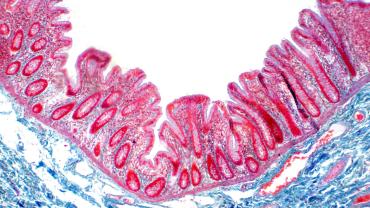
It has been shown that L-glutamine, an amino acid, is vital for maintaining a healthy gut barrier function. The health of the gut barrier's mucosal epithelium is critical for proper digestion and absorption of essential nutrients. The mucosal epithelium also serves as a structural and immunological barrier against a wide range of potential toxins, allergens, and pathogens that enter the gut lumen.
The Importance of a Healthy Gut Barrier Function
The gut mucosa is lined with rapidly proliferating epithelial cells that endure constant damage from daily functioning. Under normal conditions, gut mucosal integrity is quickly restored after minor injury. However, excessive exposure to stress, food allergies, alcohol, antibiotics, and malnutrition can compromise intestinal mucosal integrity, known as intestinal permeability or "leaky gut syndrome." Intestinal permeability may allow potentially harmful compounds to enter the body's circulation, leading to increased oxidative stress and inflammation. It is also associated with developing certain GI conditions, such as inflammatory bowel disease and irritable bowel syndrome (IBS).
Glutamine's Role in Gut Health
Glutamine is required for proper cell proliferation, differentiation, integrity, maintenance, and repair of the intestinal epithelial barrier. This is primarily due to glutamine being the preferred fuel source for rapidly dividing enterocytes and colonocytes. Therefore, glutamine depletion can lead to dysfunctional intestinal epithelial cells and tight-junction proteins. Low serum glutamine status in adults and children has been associated with unhealthy intestinal barrier function, inflammation, and gastrointestinal complaints.
Glutamine is a conditionally essential amino acid. Exogenous glutamine sources are required during times of stress, such as trauma, sepsis, or exercise. It has been shown that prolonged exhaustive exercise can lead to approximately a 25% drop in plasma glutamine levels. Plasma glutamine status may also decrease during fasting or due to dysregulated glucose metabolism.
A randomized controlled trial (RCT) with 30 patients with Crohn’s disease showed that individuals who received glutamine supplementation displayed significantly improved intestinal permeability (assessed by the lactulose/mannitol test and morphology). However, similar results were observed in the control group (whey protein). In another RCT (n = 106), patients with post-infectious diarrhea-predominant IBS with increased intestinal permeability (assessed by the lactulose/mannitol test) received a placebo or 5 g of glutamine three times a day for eight weeks. The experimental group displayed significantly improved symptom scores, stool frequency, and stool form. “Intestinal hyperpermeability” was normalized in the glutamine group, but not the control group. The researchers conclude that larger RCTs are required, as the results may not be generalizable to other populations, such as those with constipation-predominant IBS.
Glutamine, Exercise, and Gut Barrier Function
It has been suggested that glutamine may help attenuate exercise-induced gut barrier dysfunction, which can occur after high-intensity exercise. Ten recreationally active males performed four sets of 60-minute treadmill runs at 70% of VO2 max in a room set to 86°F. They were given a placebo and three different glutamine trials (0.25, 0.5, or 0.9 g/kg of fat-free mass) two hours before exercising. Relative to the placebo, the athletes in all three glutamine trials displayed reduced intestinal permeability (measured with a serum lactulose/rhamnose ratio). Similar results were found in an RCT with eight endurance-trained adults. The study also suggests that glutamine helps to promote healthy inflammatory responses post-exercise.
Summary
In vitro and human clinical studies support the role of glutamine in promoting gut barrier function. Given the increased demand for glutamine during times of stress or exercise, consuming glutamine-rich foods or supplementation when needed may promote overall gut health.
By Danielle Moyer Male, MS, CNS, LDN